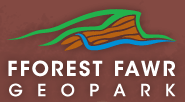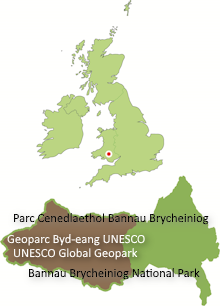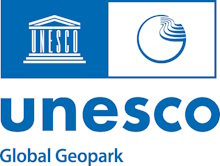Open up any map of Fforest Fawr UNESCO Global Geopark and the distinctive place-names leap out. To anyone who has an understanding of the Welsh language, these names add another layer of detail to an understanding of the landscape.
Welsh is a language rich in terms for natural features – after all Wales can boast a great diversity in its countryside. There are, for example, many different terms for ‘hill’:
- bryn / fryn / *bryniau (bank)
- tyle / tylau (rise/s or slope/s)
- moel / foel (‘bald’ rounded hill)
- ban / fan / *bannau (peak/s)
- rhiw (slope)
- mynydd / fynydd / *mynyddoedd (mountain/hill)
and ‘cliff’ or ‘rock’:
- tarren / darren / *tarenni (rocky edge)
- craig / graig / *creigiau (cliff/s)
- carreg / garreg / *cerrig (rock/s)
- maen / faen / *meini / *feini (stone/s)
and indeed for wet ground!
- cors / gors / *gorsydd (bog)
- gwaun / waun / *gweunydd (moor)
- mign / fign (bog)
- pant / bant / *pantiau (hollow – often wet!)
Apart from the normal form of words (in bold), common mutations are shown and an * indicates spelling in plural use.
Each of these can say something about the nature of the ground before we even set eyes on it.
Colours too, abound in place names – they might relate to the rocks below or else to the colour of the vegetation above:
- gwyn / gwen / wen / *gwynion / *wynion (white)
- du / ddu / *duon (black)
- llwyd / lwyd / *llwydion (grey)
- melyn / felyn (yellow)
- coch / goch / *cochion (red)
- glas / las / *leision (blue/green)
Trees make frequent appearances:
- onnen / *onnau (ash)
- derwen / *derw/deri (oak)
- bedwen / fedwen / *bedw / fedw (birch)
- celynnen / gelynnen / *celyn (holly)
- gwernen / wernen / *gwern / *wern (alder)
- cerddinen / gerddinen / *cerddin (rowan)
Welsh belongs to a different family of languages from English. In common with its siblings – Breton and Cornish – and its cousins – Gaelic and Irish – its words often ‘mutate’. So, for example bryn becomes fryn, ban becomes fan, du becomes ddu and glas becomes las. Take time to learn a bit (or a lot!) and you won’t regret it. It will open up a new window for you on Wales and indeed on Fforest Fawr.



